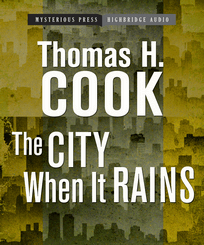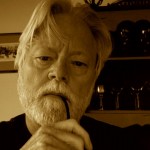 I’ve been wanting to listen to the Mysterious Press-HighBridge Audio Classics recording of Thomas H. Cook‘s The City When It Rains for a while, ever since meeting Tom at Bouchercon in St. Louis and hearing that this was the favorite of his many books. A recent road trip provided the perfect opportunity for me to take in R. C. Bray’s reading of this atmospheric novel.
I’ve been wanting to listen to the Mysterious Press-HighBridge Audio Classics recording of Thomas H. Cook‘s The City When It Rains for a while, ever since meeting Tom at Bouchercon in St. Louis and hearing that this was the favorite of his many books. A recent road trip provided the perfect opportunity for me to take in R. C. Bray’s reading of this atmospheric novel.
David Corman is a stringer, a freelance photographer who follows police radio tips and roams the streets of New York in pursuit of the great news shot, the picture that perfectly tells the story without bathos or cliché. Under the tutelage of his mentor Lazar, Corman left a secure teaching job in pursuit of the “Old City,” a vision of an essential New York that underlies the gloss and dreariness of modern life. First Lazar and now Corman are heirs to the great photojournalists of the ‘30s, ‘40s, and ‘50s such as Weegee and the old Police Gazette shooters. And Corman’s definitely got the eye. He understands what it means to try to evoke vital truths within a fixed frame. But it’s a tough business, and the wolf is at his door: months behind on rent, he’s facing eviction, and his ex-wife, who remarried into wealth, is angling for custody of their daughter, Lucy.
The City When It Rains is a mystery, but it’s unlike any mystery I’ve read. For one thing, there’s nothing remotely formulaic or derivative about it. There is no murder investigation, no serial killer, no complex financial caper to pull off or thwart, no tough-guy detective. The mystery here is far more human, far more specific: what is the story behind the jumper suicide lying face down in a rain-slicked street whom Corman photographs one night? What is the meaning of the doll wrapped in a blue blanket lying at her fingertips? Who was she; what led her to her fate?
 Cook asks some big questions along the way, the largest among them being the competing pulls of art and life, whether it’s possible to get by without compromise in a harsh and often unforgiving world while pursuing the thing one seems to have been born to do. It’s the artist’s central dilemma; as Yeats put it: “In luck or out the toil has left its mark:/That old perplexity an empty purse,/Or the day’s vanity, the night’s remorse.” And the compromises Corman faces are tough: does he pursue his compulsion to understand this suicide, a young woman who went from Columbia graduate to near starvation and early death? And even more critically, does he honor his own powerful artistic drive to photograph the Old City before it disappears, all at the risk of losing his daughter and everything else?
Cook asks some big questions along the way, the largest among them being the competing pulls of art and life, whether it’s possible to get by without compromise in a harsh and often unforgiving world while pursuing the thing one seems to have been born to do. It’s the artist’s central dilemma; as Yeats put it: “In luck or out the toil has left its mark:/That old perplexity an empty purse,/Or the day’s vanity, the night’s remorse.” And the compromises Corman faces are tough: does he pursue his compulsion to understand this suicide, a young woman who went from Columbia graduate to near starvation and early death? And even more critically, does he honor his own powerful artistic drive to photograph the Old City before it disappears, all at the risk of losing his daughter and everything else?
 R. C. Bray’s narration is stunning. His deep, clipped, slightly husky voice perfectly captures Thomas H. Cook’s evocation of the shapes and shadows and feel of the big city at night in the rain. His soft accents and vocal characterizations of a wide-ranging cast of disparate ethnicities, sexes, and ages are spot on and so consistent throughout that you always know immediately who is speaking. Cook’s crisp prose conveys the complexities, contradictions, and concessions of one man’s urban existence while raveling out the strands of another person’s life and death, a life seemingly lost to the world and without consequence. It’s a tale that asks hard questions about what we owe to each other, and to ourselves.
R. C. Bray’s narration is stunning. His deep, clipped, slightly husky voice perfectly captures Thomas H. Cook’s evocation of the shapes and shadows and feel of the big city at night in the rain. His soft accents and vocal characterizations of a wide-ranging cast of disparate ethnicities, sexes, and ages are spot on and so consistent throughout that you always know immediately who is speaking. Cook’s crisp prose conveys the complexities, contradictions, and concessions of one man’s urban existence while raveling out the strands of another person’s life and death, a life seemingly lost to the world and without consequence. It’s a tale that asks hard questions about what we owe to each other, and to ourselves.
The City When It Rains is a true noir classic, and Bray’s reading does justice to every word.

No Comments so far ↓
There are no comments yet...Kick things off by filling out the form below.